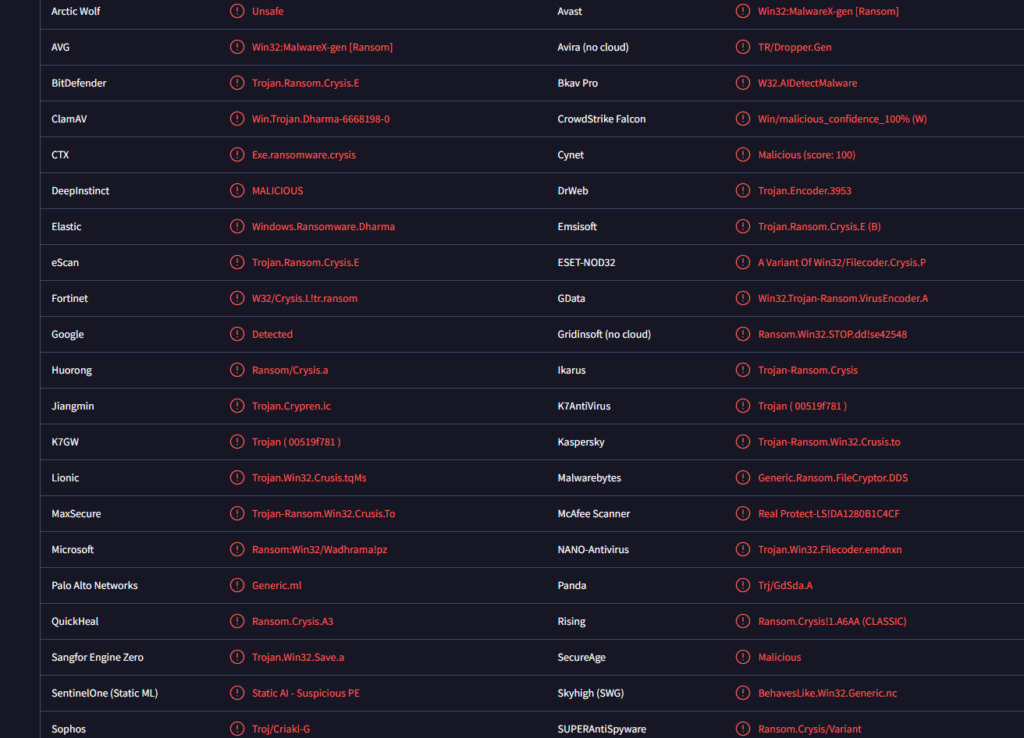Remove Zen ransomware
Zen ransomware is file-encrypting malware that comes from the Dharma ransomware family. It’s a type of malware that encrypts files and makes them unopenable. The ransomware is identifiable by the .[zen_crypt@tuta.io].zen extension that gets added to encrypted files. Unless you put them through a decryptor, you will not be able to open files that have that extension. Unfortunately, acquiring the decryptor is not easy, as only the malicious actors behind this ransomware have it.
The Dharma malware family has rolled out numerous ransomware variants over the past few years. While they share many similarities, you can distinguish them by the unique extension they add to encrypted files. This particular variant is known as Zen ransomware, indicated by the extension .unique ID.[zen_crypt@tuta.io].zen. For example, an encrypted file named image.jpg will become image.jpg.unique ID.[zen_crypt@tuta.io].zen. As you may have realized, you cannot access these encrypted files unless you first use a decryptor. Currently, the only ones with a functioning decryptor are the operators of this ransomware.
After all targeted files are done being encrypted, the ransomware will drop an info.txt ransom note. The note explains what you already know, and offers a decryptor if you’re willing to pay a ransom. Although the ransom amount isn’t specified in the note, it typically ranges from several hundred to several thousand dollars. The note also mentions that users can recover 3 files for free as long as they do not contain any important information. It’s important to be aware of the risks involved in paying ransomware, as you’re dealing with cybercriminals who may further exploit you for profit. They may take money and not provide the decryption tool.
The full Zen ransomware ransom note is below:
All your files have been encrypted!
Don’t worry, you can return all your files!
If you want to restore them, write to the mail: zen_crypt@tuta.io YOUR ID –
If you have not answered by mail within 12 hours, write to us by another mail:zen_crypt@cyberfear.comFree decryption as guarantee
Before paying you can send us up to 3 files for free decryption. The total size of files must be less than 3Mb (non archived), and files should not contain valuable information. (databases,backups, large excel sheets, etc.)How to obtain Bitcoins
Also you can find other places to buy Bitcoins and beginners guide here:
hxxp://www.coindesk.com/information/how-can-i-buy-bitcoins/Attention!
Do not rename encrypted files.
Do not try to decrypt your data using third party software, it may cause permanent data loss.
Decryption of your files with the help of third parties may cause increased price (they add their fee to our) or you can become a victim of a scam.
If you have a backup, recovering your files should be straightforward, as long as you remove Zen ransomware from your system first. If the ransomware is still present when you access your backup, your backup files could also become encrypted, making recovery impossible.
If you do not have a backup and have no other means of recovering your files, your best bet may be to wait for malware researchers to create a free decryptor. However, this may not be feasible at the moment. If a free Zen ransomware decryptor is released, it will likely be available on NoMoreRansom.
How does ransomware infect a computer?
If you have poor browsing habits, you increase your risk of encountering various types of infections. This is especially true if you tend to open unsolicited email attachments, engage in piracy via torrents, click on ads while visiting risky websites, or fall for fake update prompts. By developing better online habits, you can significantly reduce your chances of encountering malware.
For those who pirate copyrighted material, it’s likely no secret how easily ransomware and other forms of malware can be picked up. Torrent sites are often poorly regulated, allowing malicious actors to upload malware disguised as torrents for popular movies, TV shows, games, and software. Not only is piracy akin to stealing, but it can also severely jeopardize your computer’s safety.
The most prevalent way for users to contract ransomware is through email attachments. Emails that carry malware remain harmless unless you click on links or open attachments. If you do open a harmful attachment and enable macros, you’ll inadvertently allow the ransomware to execute. Thankfully, unless someone is specifically targeted, malicious spam emails tend to be fairly easy to recognize. They are often sent from random email addresses, filled with grammar and spelling errors, and pressure you to open the attachment. These attachments are frequently disguised as important documents like invoices or receipts. We highly recommend scanning any unsolicited attachments with anti-virus software or VirusTotal.
How to delete Zen ransomware
To effectively and completely remove Zen ransomware, you need to use anti-virus software. Attempting a manual removal may lead to further complications. Additionally, removing the ransomware alone won’t restore your files; you will need a decryptor for that purpose.
Site Disclaimer
WiperSoft.com is not sponsored, affiliated, linked to or owned by malware developers or distributors that are referred to in this article. The article does NOT endorse or promote malicious programs. The intention behind it is to present useful information that will help users to detect and eliminate malware from their computer by using WiperSoft and/or the manual removal guide.
The article should only be used for educational purposes. If you follow the instructions provided in the article, you agree to be bound by this disclaimer. We do not guarantee that the article will aid you in completely removing the malware from your PC. Malicious programs are constantly developing, which is why it is not always easy or possible to clean the computer by using only the manual removal guide.

